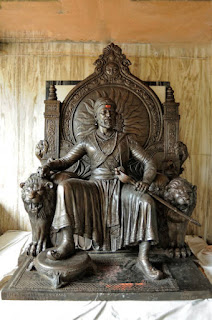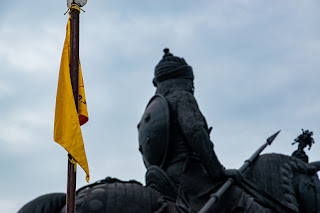Who Is Best Warrior Between Maharana Pratap And Shivaji?
For those familiar with the heroic tradition of the Mewar warrior, historian Reema Hujas's book helps to contextualize his success as a man who valiantly resisted the might of the Mughal Empire at its peak, despite being exiled for a long time from his kingdom. Known as a formidable warrior and an excellent combat strategist, Pratap defended the Mewar region from repeated attacks by the Mughals.
While Shivaji used the services of his mawla - exiles from different castes and religions - the Pratap before him was protected by the Bhil tribe, who he eventually recruited to join Afghan warriors against the Mughals. In many ways, Maharana Pratap of Mewar and Chhatrapati Shivaji of Marathi district are warrior brothers linked by blood histories. He turned the untouchable community of Mahars, to which Babasaheb Ambedkar belonged, into a group of warriors, assigned appropriate roles in fighting and defending their fortresses. Likewise, Chhatrapati Shivaji, in his 35-year struggle against the Mughal Empire and the combined Deccan Sultanate of Bijapur and Golconda, awakened all peoples to freedom demand and make extensive use of their skills.
As mentioned above, both Rana Pratap and Shivaji have launched a national struggle against foreign rule and Muslim tyranny, which also involves people of all classes, including moderate Muslims. Also, they fought in more unfavourable circumstances than the Mahatma. It was not a religious war as Hakim Khansur led the army on behalf of Rana and Mansingh on behalf of Akbar. In fact, some of Pratap Singh's main allies were Afghan Muslims from Bihar and Bengal, all descendants of the Lodi dynasty, defeated by the Babur-ruled Mughals in AD 1526. Among Pratap's most trusted infantry, Hakim Khansur belonged to the Sur Sher Shah Sur dynasty, which was once again defeated by Akbar.
One of the most famous and successful against Pratap Singh was the ruler of Amber, Man Singh. Prithviraj was undoubtedly a valiant king who defeated the Turkish ruler Mohammad Ghori in the first battle of Tarain. The brave Prithviraj killed Gori with the powers of shabdbhedi baan even after losing his eyes in captivity.
Instead, at the Second Battle of Tallinn, Guri defeated Prithvera and captured him. The battle was between the Marathas led by Shivaji and Kartalab Khan of the Mughal Empire. The Mughals ambushed Shivaji when he returned from a sack in Jharna. The Mughal emperor Aurangzeb sent his general Jasingh to besiege Shivaji's fort at Panala.
After the battle, the Mughal forces, led personally by Akbar, went on to conquer the entire Mewar region, including Chittor, Gogunda, Kumbhalgarh (Pratap's temporary capital), and Udaipur. Man Singh and Asaf Khan raised an army almost half the size of the Mughal military and took up position at Haldighati, a mountain pass about 40 kilometers from Udaipur. Despite this, Maharana Pratap won the battle. However, Pratap's chief Man Singh Jala swapped armor with Pratap to confuse the Mughal army.
Pratap's stepmother, Rani Dhir Bai, wanted Kunwar Jagmal to become king after Udai Singh was defeated by Mughal emperor Akbar. The Marathas were led by Prince Sambaji, while the Mughals were led by Shigir Khan. 1672 Koli Land) was a battle in which the Maratha army under Shivaji's son Prince Sambaji defeated the Koli kings of Jahar and Ramnagar and Allied forces of the Mughal Empire. The Battle of Vikramgad was a land battle between the Maratha Empire and the Mughal Empire in 1672 near Vikramgad in the Parga district of Maharashtra.
The Battle of Kolhapur was a land battle fought on December 28, 1659 near the city of Kolhapur in Maharashtra between the armies of Marathi kings Shivaji and Adilshahi. The Battle of Pratapgad was a battle fought at Pratapgad Fort near the city of Satara, Maharashtra, India on November 10, 1659 between the Marathas army led by Marathas Shivaji and the forces of Adilshahi Afzal General Khan. It was their first major military victory over a major regional power and led to the creation of the Maratha Empire.
The Marathas had in their forces groups of Lamani and Pindari tribes, former Mughal soldiers turned into mercenaries. The Pindaris, who were mostly Muslims, did not receive any wages, earning their money by plundering the territories captured by the Marathas.
Shivaji trained him as a Dand-Patta expert and made him a personal bodyguard. Shivaji chose him when he saw Mahale of Konkan village practicing Dand Patta (a straight Roman sword that swings when used in battle and is very famous in Maharashtra). Interestingly, the plot involving Rana Pratap and the tribal chief Rao Punja has similarities with the case of Shivaji and a Nai warrior (caste of barbers) named Jiva Mahale.
Sambhaji Raje Chhatrapati, the 13th descendant of the Maharashtra royal family, is a direct descendant of the legendary Chhatrapati Shivaji Maharaj with Lakshyaraj, the 76th custodian of the 1,500-year-old Mewar House in Udaipur Prince Singh Mewar in Saran Head together. Interestingly, the largest horse show in Asia held in Sarangkhed is named after Maharana Pratap's famous horse Chetaka. The founder of India's Maratha dynasty, Chhatrapati Shivaji, is considered one of the bravest warriors who dared to resist the mighty Mughals and defeated them many times. In Indian popular culture, Pratap is considered an example of the bravery and chivalrous qualities that the Rajputs aspire to, especially in the context of his opposition to the Mughal emperor Akbar. The struggle between the Rajput Confederation led by Pratap Singh and the Mughal Empire under Akbar is often depicted in Hindu pop culture as a struggle between Hindu and Muslim invaders, This is very similar to the fight between Shivaji and Aurangzeb. A century later.
Cited Sources
- https://timesofindia.indiatimes.com/city/nashik/inheritors-of-two-great-warriors-meet-at-sarangkheda/articleshow/56143482.cms 0
- https://www.indiatoday.in/education-today/gk-current-affairs/story/maharana-pratap-322386-2016-05-09 1
- https://www.dailyo.in/politics/gandhjii-rana-pratap-shivaji-modi-medieval-india-mughal-empire-ambedkar-rashtrapita-rashtra-gaurav-purush/story/1/3664.html 2
- https://thefreedompress.in/2021/10/28/unfair-that-robert-clive-addressed-as-the-great-not-shivaji-or-rana-pratap-vice-prez/ 3
- https://www.financialexpress.com/india-news/up-cm-yogi-adityanath-heaps-praise-on-rajput-warrior-king-maharana-pratap-and-maratha-warrior-king-chhatrapati-shivaji/689979/ 4
- https://www.business-standard.com/article/news-ians/maharana-pratap-a-warrior-who-withstood-the-might-of-mughal-empire-at-its-peak-book-review-118112100393_1.html 5
- https://my-expriences.blogspot.com/2021/03/best-warrior-maharana-pratap-vs-shivaji.html 6
- https://www.scrolldroll.com/warriors-in-indian-history/ 7
- https://deadliestfiction.fandom.com/wiki/Maharana_Pratap 8
- https://siachenstudios.com/list/greatest-warriors-of-all-time-15-best-fighters/ 9
- https://en.wikipedia.org/wiki/Battles_involving_the_Maratha_Empire 10
- https://scroll.in/article/855307/why-do-indians-celebrate-rulers-like-tipu-and-shivaji-but-not-the-greatest-of-them-all-akbar 11










